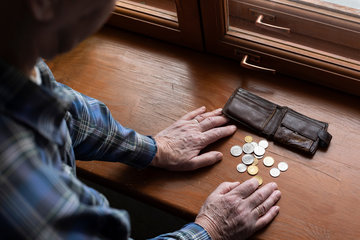The Rich, the Poor and Social Cooperation
Rich people are believed to be more cooperative than poor people, an economist from the Max Planck Institute for Tax Law and Public Finance found.
The thicker the wallet, the more cooperative you are? An economist from the Max-Planck-Institute for Tax Law and Public Finance proves via laboratory experiments that rich people are believed to be more cooperative than poor people - by both the "rich" and the "poor". This aspect of conditional cooperation, which is, so far, only poorly understood, can help explain cooperation failures in socially diverse groups. This is because how cooperative we behave depends strongly on how cooperative we believe our counterpart to be.

© iStock / frimages
People tend to condition their cooperation on what is believed of others: The more cooperative they think others are, the more cooperative they are themselves. Within a social group, cooperative behaviour tends to increase when some inidviduals in the group are believed to behave cooperatively.
Andrea Martinangeli conducted laboratory experiments in order to investigate a potential and so far poorly understood aspect of conditional cooperation that might lead to persistent cooperation failures in socially diverse contexts: the cooperativeness attributed to others not based on previously observed behaviours, but based on the amount of economic resources to them available. The economist had the subjects of his study play a variant of the so-called public good game, in which participants secretly decide how much of their initial endowment they want to invest in a public good. At the end of the game, the common pot is multiplied and is divided equally among all players, creating a tension between self- and group-interests.
Martinangeli’s experiment shows that inequality shapes the belief people hold about others’ willingness to cooperate. That is, individuals’ beliefs about their counterparts’ cooperativeness are driven by the amount of resources available to them: rich subjects are always believed, by both the rich and the poor, to cooperate more. Furthermore, absent information allowing beliefs to be precisely updated, individuals’ long-run cooperative behaviours correlate strongly, positively and significantly with their beliefs about the rich but not with those about the poor. This finding is suggestive evidence that the expectations of cooperativeness placed upon the rich might be the main drivers of individuals’ cooperativeness in economically diverse social contexts.
Gaining an insight into which social groups are believed to be more cooperative and generate stronger conditional behaviours, Martinangeli concludes, could prove a viable tool to foster social cooperation through effective information dissemination or via adequate institutional design. Though reported only in a footnote, the experimental data also provides us with a warning: despite what generally believed of them, the ‘rich’ systematically cooperated relatively less than their ‘poor’ counterparts.












